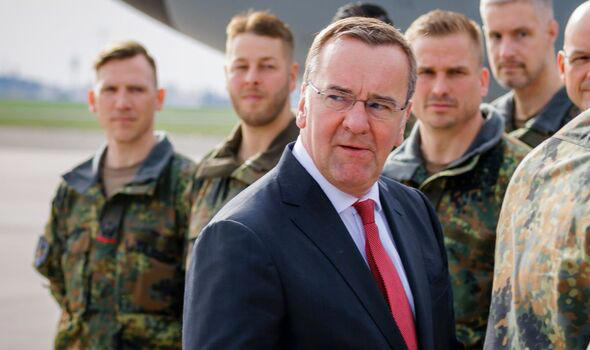Table of Contents
ToggleNATO-Russia Tensions: Germany’s Bold Move Amidst Rising Concerns
Amidst escalating NATO-Russia tensions, Germany’s decision to station troops in Lithuania raises eyebrows. Delve into the implications and reactions in this insightful piece.

© GETTY
NATO-Russia Tensions: Understanding the Stakes
In a world where tensions between NATO and Russia are on the rise, recent developments have grabbed headlines. One such development is Germany’s decision to deploy troops to Lithuania, a move that signals a proactive stance against potential threats from the east.
Germany’s Bold Move
Germany, a key player in European politics, has decided to step up its military presence outside its borders. By stationing troops in Lithuania, it aims to bolster NATO’s defense capabilities and deter any aggressive moves by Russia. This historic decision underscores the seriousness of the situation and the need for collective action.
Lithuania’s Vulnerability
Lithuania, nestled on NATO’s eastern flank, has long been viewed as a vulnerable spot in Europe’s security landscape. Its proximity to Russia and historical ties to Moscow make it a potential target for aggression. The deployment of German troops aims to shore up Lithuania’s defenses and send a clear message to any would-be aggressors.
Strategic Significance of the Deployment
The deployment of German troops to Lithuania holds strategic importance, particularly in light of the Suwalki Gap. This narrow strip of land between Belarus and Kaliningrad has emerged as a potential flashpoint in recent years. By bolstering defenses in the region, NATO hopes to prevent any attempts to destabilize the area.
Kremlin’s Response
Unsurprisingly, Russia has reacted strongly to Germany’s decision to deploy troops to Lithuania. The Kremlin views this move as a provocation and a threat to its own security interests. Dmitry Peskov, a spokesman for President Putin, warned of “danger zones” near Russia’s borders, signaling Moscow’s displeasure with the deployment.
Implications for Regional Security
The deployment of German troops to Lithuania has far-reaching implications for regional security. It demonstrates NATO’s commitment to collective defense and sends a clear message to any potential aggressors. However, it also raises concerns about the risk of escalation and the need for diplomatic solutions to defuse tensions.
Germany’s Commitment to NATO
German Defense Minister Boris Pistorius has reaffirmed his country’s commitment to NATO and its allies. He emphasized the importance of equipping the deployed troops and ensuring they have the resources they need to fulfill their mission. Germany’s willingness to take proactive steps to enhance European security is a testament to its leadership in the alliance.
Challenges Ahead
As the deployment of German troops to Lithuania moves forward, there are challenges to overcome. Building infrastructure, providing accommodations, and integrating with local forces are just a few of the tasks that lie ahead. However, NATO remains resolute in its determination to strengthen defenses and maintain peace and stability in the region.
Conclusion: Navigating Uncertain Waters
In conclusion, the deployment of German troops to Lithuania amidst NATO-Russia tensions underscores the complexities of the geopolitical landscape. While it represents a bold step towards enhancing European security, it also highlights the fragility of peace in the region. As tensions simmer and tempers flare, diplomacy and dialogue will be essential in navigating these uncertain waters.
ALSO READ:
“Breaking: Houthi Rebels Strike Tanker Loaded with Russian Oil! What You Need to Know!”